Calibration period for cold and hot water meters: calibration intervals and rules for conducting them
Among the various expense items in the family budget, payment for housing and communal services remains one of the most significant for many Russians. Therefore, in order not to pay inflated rates and save a little, water meters are now being installed everywhere in apartments and cottages, which must be regularly verified.
It is imperative to comply with the verification period for cold and hot water meters - this will allow problems in their operation to be identified in a timely manner.
In this material we will tell you how water meters are checked, about verification intervals, as well as what awaits users for failure to meet deadlines.
The content of the article:
Legislative regulation of verifications
All issues of installation, inspection and commissioning of indoor water meters are regulated by Decree of the Government of the Russian Federation No. 354 dated 05/06/2011 with the latest amendments. According to it, the owner of the property is solely responsible for the functionality of the water meters in the apartment.
Any measuring device does not last forever. Gradually, the accuracy of his measurements begins to decline. And here it doesn’t matter whether it’s a household meter, a common household device, or laboratory equipment.
In all cases, according to the current Russian legislation, such technical means are subject to certification and regular verification (testing) to ensure correct operation.
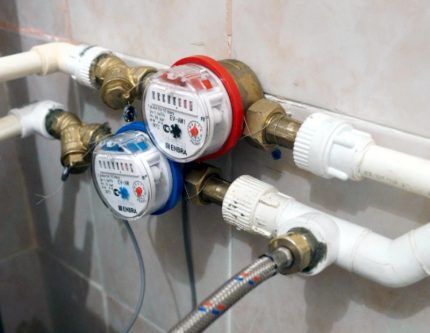
A decrease in the measurement accuracy of water meters occurs due to:
- breakdowns and wear of internal elements - the impeller and counting mechanism;
- water of poor quality with a high content of salts and metals;
- contamination getting into the pipes - sand, rust, etc.;
- damage to the device as a result of external mechanical influences;
- drying out of the mechanisms inside due to a prolonged shutdown of water supply;
- use of low-quality or defective parts in the production of the device.
There are many factors influencing the accuracy of measurements. Even the presence of a magnet next to the meter affects its correct functioning. However, the law requires verification to be carried out only after the expiration of the inter-verification service life of the water meter established by the manufacturer.
At the same time, if the water meter has completely stopped working, has cracks in the body or leaks, then it should be replaced immediately. You cannot wait until the next test according to the technical passport.
If a foreman from the housing office comes and sees a broken metering device, then fines and charges will follow in the receipt, not based on consumption, but according to standards.
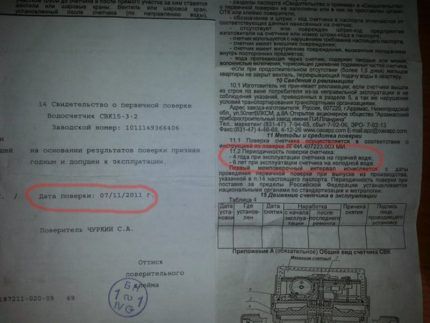
The water meter manufacturer sets the calibration interval. The law regulates only the requirement that the metering device is in good working order. As long as it is in good working order, the calculation of water consumption is based on it.
But if the meter is broken or the period specified in the technical passport has expired since the last test, then the management company or HOA begins to charge for the resource according to the standards.
The consumption rate for hot water supply in the Russian Federation is set at 4.75, and for cold water - 6.93 cubic meters per person/month. But in reality, each person living in an apartment usually consumes about 1–3 cubic meters of hot and cold water combined during the specified period.
The actual overpayment of the tariff ends up being two to three times. And so on every month. There are reasons to install a meter and maintain it in good condition.
Water meter testing algorithm
In order for water consumption to be calculated using a meter, it must be put into operation. That is, you must have a corresponding act on hand from an employee of the organization providing utility services. Without this document, the device readings are not taken into account; the calculation is carried out according to the standards.
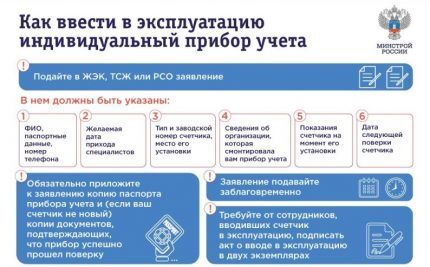
When the inspection deadline approaches, you should:
- Submit an application to the apartment maintenance organization to remove the water meter.
- After dismantling the device, give it for testing to a specialized company that has the appropriate license.
- In a day or two, receive a certificate of verification and serviceability of the tested water meter, as well as the meter itself back.
- Submit an application again to the Housing Office for the installation of a meter and receive a certificate from the plumber about putting the meter into operation.
- Submit copies of both documents to the service company.
After this, the calculation of water consumption starts again according to the meter.
Nuances of the procedure
First important point – installation and dismantling of meters can be carried out on one's own or by inviting specialists from a third-party organization (not from the Housing Office).
The law only establishes the need to obtain a commissioning certificate, which can only be signed by a representative of the organization managing the house.
Another particularly interesting nuance – water consumption on the days when verification occurs. After removing the water meter, a hose is installed in its place. And the calculation for the days when the verification was carried out will be carried out according to the standards.
After the water meter is installed by a housing office employee and the corresponding document is issued, its readings will again be taken into account when generating bills for water consumption.
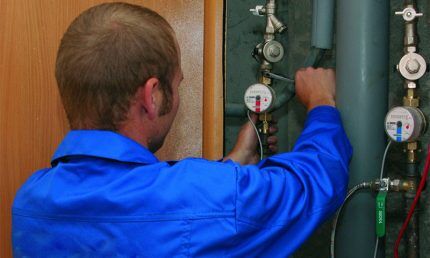
In practice, everything usually looks like this: the homeowner removes the meter and gives it for verification, and then installation and sealing invites an employee of the management company to obtain the required act.
Or the device is simply replaced without any checks with a new one, and then a housing office employee is called to sign the same act.
Checking the water meter at home
In addition to submitting the water meter for testing to a specialized company, it can also be tested directly in the apartment. Such tests are carried out on special compact equipment that the performer brings with him.
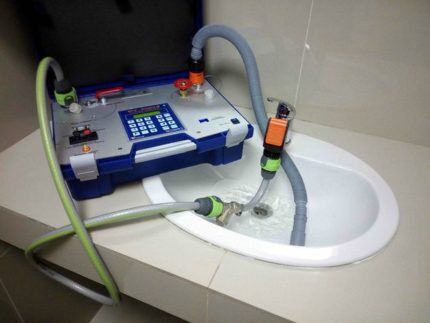
If you give the meter to a company for testing, such a test will cost 1.5–2 times less.You will have to pay extra money to call a specialist.
The cost of verification in different Russian cities ranges from 500–2000 rubles. Plus money for dismantling and reinstalling the meter in place. At the same time, calling the housing foreman to sign the commissioning act should be free. If the housing office demands money for this procedure, then this is illegal.
However, the new household appliance itself water meter costs about 500–1000 rubles in the store. If the model is electronic with automatic data transfer to the management company, then it will cost more. But an ordinary mechanical water meter costs around half a thousand rubles.
Read about how meters are verified at home. this material.
Therefore, many homeowners, when the verification deadline approaches, often simply replace the measuring device with a new one without any double-checking of it for measurement accuracy. This way it often works out cheaper.
Meter verification intervals
The manufacturer sets the frequency of verification for each water meter independently. To do this, he carries out a certain set of tests and coordinates everything with the State Standard of the Russian Federation.
There are meters on sale with a calibration period of both 4 years and 10–15 years. When choosing a meter, you should definitely look at this figure in the technical data sheet. The longer the time period indicated there, the less often you will have to check and, if necessary, change the measuring equipment.
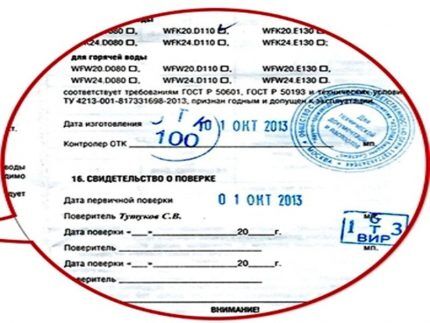
When purchasing a water meter, it is extremely important to look at when it was verified.Initially, it is done by the metering device manufacturer at the factory. All subsequent tests must also be included in the device passport.
If you take and install a meter that is almost expired interverification period, then it will have to be changed again soon. And this again means spending on the device and installation work.
Consequences if deadlines are missed
You should not initially wait for the end of this period. It is better to carry out verification in a month or two and not worry about large charges in the receipt for cold and hot water supply. At the same time, we must also remember about drainage; it is also calculated based on the volume of water consumed.
If the meter verification period has expired, then water consumption is calculated according to:
- the average water consumption of the apartment over the past six months;
- established norm of water consumption per person;
- number of people living in the apartment.
According to the law, if the owner of the property stops supplying data from the water meter, the management organization does not have the right to charge according to the standards for three months.
The state provides this three-month period in case of temporary problems with the payer’s money or simply not consuming water for a couple of months. If the data submission starts again, then a recalculation is simply made in the receipt and that’s it.
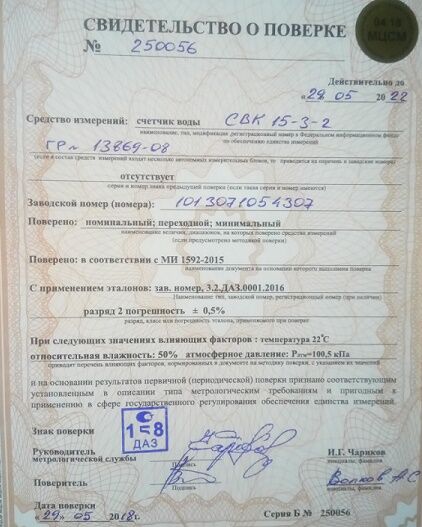
But after three months of absence of data from the meter, the management company has every right to begin accrual according to average standards.
If you are leaving home for three months or more, it is recommended to notify the housing office and shut off the water supply. Otherwise, upon your return, you may be in for an unpleasant surprise in the form of a receipt for housing and communal services.
Conclusions and useful video on the topic
Checking water meters - what to pay attention to:
Checking the water meter - what it is and why:
How does home verification work:
You must always fulfill your obligations. Regular checking of water meters is one of the obligations of the owner of a home connected to the water supply.
If you delay tests, either on purpose or simply forgetting about them, then penalties will inevitably follow from the management company. According to the law, they will be completely right; there is no point in delaying the check.
Still have questions about the topic of the article? Or can you supplement the material with interesting information? Please leave your comments, share your experience, and ask questions in the contact block, which is located under the article.



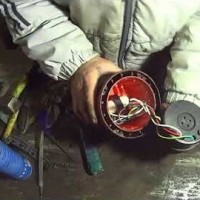
Interesting. We had meters installed a long time ago, more than 4 years for sure. As they checked and sealed it during installation, no one has come since then. Do you have to go to the Management Company yourself and write an application to have your water meters checked? I don’t want to receive fines or pay according to regulations. I’ll look for the meters’ passports to check what their verification period is, maybe it’s 10-15 years and it’s just not time yet.
Hello. For some reason, the Criminal Code has a habit of setting standards for its own mistakes. And we will look at the Decree of the Government of the Russian Federation of May 6, 2011 N 354. We need paragraph 81 part 6:
«Based on the results of checking the metering device, the contractor draws up an act of putting the metering device into operation, which indicates:
a) date, time and address of putting the metering device into operation;
b) last names, first names, patronymics, positions and contact details of persons who took part in the procedure for putting the metering device into operation;
c) the type and serial number of the installed metering device, as well as the location of its installation;
d) a decision to commission or refuse to commission a metering device, indicating the grounds for such refusal;
e) in the case of putting the metering device into operation, the readings of the metering device at the time of completion of the procedure for putting the metering device into operation and an indication of the places on the metering device where control disposable number seals (control seals) are installed;
e) date of next verification«.
That is, you must have a document in your hands that indicates the approximate date of verification.
Now we will look at the obligations of the parties in the same document, only now in paragraphs 82-83:
«The performer is obliged:
a) carry out checks of the condition of installed and put into operation individual, common (apartment), room metering devices and distributors, the fact of their presence or absence;
b) carry out checks of the reliability of the information provided by consumers about the readings of individual, common (apartment), room metering devices and distributors by comparing them with the readings of the corresponding metering device at the time of verification (in cases where the readings of such metering devices and distributors are taken by consumers).
83.The checks specified in paragraph 82 of these Rules must be carried out by the contractor at least once a year, and if the metering devices being checked are located in the consumer’s residential premises, then no more than once every 3 months«.
That is, checking the meter is the responsibility of the contractor, and not the concern of the consumer.
How does this happen:
«85. The checks specified in paragraph 82 of these Rules, if they require access to the consumer’s residential premises, are carried out by the contractor in the following order, unless otherwise provided by the agreement containing the conditions for the provision of utility services:
a) the contractor sends to the consumer no later than 14 days before the date of the inspection in a way that allows determining the date of sending such a message, or delivers, against signature, a written notice about the expected date(s) and time of the inspection, about the need to admit the contractor at the specified time to carry out the inspection with mandatory explanation of the consequences of the consumer’s inaction or his refusal to allow the contractor to access metering devices;
b) the consumer is obliged to ensure the contractor’s access to the residential premises occupied by the consumer to carry out an inspection at the time specified in the notice, except for the case when the consumer cannot ensure the contractor’s admission to the residential premises occupied by the consumer due to temporary absence, which he is obliged to inform the contractor about on time no later than 2 days before the date specified in the notice, indicating other possible date(s) and time of admission for the inspection, convenient for the consumer, while the inspection date proposed by the consumer cannot be earlier than 2 days from the date when the proposal was received from the consumer , and later than 3 days from the date specified in the notice of inspection;
c) the contractor is obliged to carry out the inspection on the date and time specified in subparagraph “a” of this paragraph, and if there is a message from the consumer about a different time in accordance with subparagraph “b” of this paragraph - on the date and time specified in such a message. Based on the results of the inspection, the contractor is obliged to immediately draw up an inspection report in the manner prescribed by these Rules;
d) if the consumer has not ensured the contractor’s access to the residential premises occupied by the consumer on the date and time specified in the notice of the inspection or in the consumer’s message provided for in subparagraph “b” of this paragraph, and at the same time, in relation to the consumer living in the residential premises, the contractor there is no information about his temporary absence from the occupied residential premises, the executor draws up an act of refusal of access to the meter;
e) the contractor is obliged to conduct an inspection and draw up an inspection report within 10 days after receiving from the consumer, in respect of whom the act of refusal of access to the metering device was left, a statement of readiness to ensure the contractor’s admission to the premises for inspection«.
So, the management company sets the date and sends you a notice of the inspection date as much as 2 weeks before it. How the fact of inspection is registered:
«85(1). The acts specified in paragraphs 62, 81(11), 82 and 85 of these Rules are drawn up by the contractor immediately after the completion of the relevant checks.
The acts are signed by the representative of the contractor who conducted the inspection and the consumer (his representative) and include the following information:
a) date, place, time of drawing up the act;
b) the circumstances in connection with which the inspection was carried out and the violations identified;
c) the composition of the persons participating in the inspection and drawing up the report;
d) signatures of the contractor (his representative), the consumer (his representative);
e) a note about the refusal of the consumer (his representative) to sign the specified act, including information about the reasons for such refusal (if any);
f) objections (position) of the consumer (his representative) in connection with the identified violation;
g) other circumstances related to the identified violation.
85(2). One copy of the act is handed over to the consumer (his representative), including by delivery or by sending a registered letter
«.And now, what some unscrupulous managers scare consumers with when they themselves miss the check:
«85(3).In the case of drawing up an act on refusal of access to the metering device provided for in paragraph 85 of these Rules, after 3 billing periods from the date of drawing up such an act, the executor has the right to calculate the payment for utilities based on the standard for the consumption of utilities, taking into account the number of permanent and temporary residents in the residential premises persons, including those specified in the act drawn up in accordance with paragraph 56(1), as well as taking into account the increasing coefficient starting from the 1st day of the month in which such act is drawn up. The value of the increasing coefficient is assumed to be 1.5«.
This is where they are, the standards and the increased coefficient - in case you, having been notified of the visit of the management company, refused them a visit within 17 days. In fact, this is how all metering devices are checked. We don’t send notices, they go door to door, if they didn’t find them or couldn’t get inside, they write out a piece of paper asking them to call and discuss the date of the inspection at a certain time. Surprisingly, on many portals, including legal ones, I came across opposite recommendations. They say, notify the Criminal Code yourself that you need to be checked, otherwise there will be a fine.
I would advise you, of course, to look at the document and look at the date. Otherwise they will say later that they sent a notice and when they came home, there was no one at home, and the fact that there is no piece of paper, maybe you deliberately hid it. You can expect anything here; trust alone will not get you far.
At first, when water meters had just begun to appear, people showed their ingenuity in order to slow down their speed. Typically, the best solution was a magnet. However, now all devices are protected by anti-magnetic seals. Therefore, it is worth paying attention to this factor.Then you won’t be able to prove to the employees of the inspection company that the meters failed due to your own fault, and you’ll have to fork out a lot of money.
Sergey, I can’t say exactly what the rules are, but we called the inspectors ourselves. They were afraid that they would then present huge amounts of money for payment, since the service life had expired. However, after verification, the meters were allowed to be used again; the devices work perfectly. I believe that the consumer himself should first of all be interested in verification.
The consumer is interested in not being charged according to the standards and not being fined. And the housing office is interested in inspections; they are all afraid that the meters are twisted or hung with a magnet.
That is, it turns out that the period for inter-interval testing is determined by the manufacturer himself, in coordination with Rosstandart and recording it in the product passport? Otherwise, the plumber of the management company demands from me in an ultimatum form that it be checked/replaced only because 4 years have passed on the hot water meter (the period in the passport is 6 years).
Hello. The date of the next IPU verification can be indicated in your receipt, in your personal account, the acceptance certificate of the previous verification, or the commissioning agreement. The rule of 4 and 6 years has long been abolished, although according to the device passport everything is strictly individual. The Contractor has the right to reschedule the verification period.
Are you a lawyer or a representative of the management company? Be more precise. The rule of 4 and 6 years has long been abolished, although according to the device passport everything is strictly individual.If cancelled, when and by whom? Complete chaos - I do whatever I want! The contractor has the right to reschedule the verification dates! Those. get people's money ready!
Hello. I'll explain. The Decree of the Moscow Government abolished the fixed periods of 4 and 6 years, however, Decree of the Government of the Russian Federation dated May 6, 2011 No. 354 states that verification periods are established in accordance with the technical documentation for metering devices.
Usually, according to the device’s passport, this is 6 years for cold water IPU, 4 years for hot water, which is where these standards at the legislative level originally came from. However, if there is a suspicion of interference in the operation of the IPU or its incorrect operation, verification may be of an extraordinary nature.
P.S. I also have IPU at home, I don’t set the standards.
Good afternoon as of 06.2019, the apartment stopped providing water meter readings and was set according to the general standard. From 08.2019 we became the owners of this apartment and also paid according to general standards. 12.2019 we found out that the metering devices had been removed from our apartment, in mid-December we put the metering devices back on the balance sheet with acts where the meter readings are written down, and in the January 2020 bill we are credited with 15 cubic meters more cold water and, accordingly, sewerage, citing that these 15 cubes from 06.2019. Is it legal to include readings from almost six months ago, despite the fact that the metering devices were removed from the apartment’s balance sheet?
Check interval! Let's say 6 years. As an operator, we need to know what resource is assigned to the meter for these 6 years? As simple as that, the manufacturer provides data on water consumption per day, from minimum to maximum throughput. Next we need to draw conclusions. How many people are registered with you, one or 100. Conclusions 6 years must correspond to the mileage. The quality of the supplied water.
Good afternoon I want to know. In a new building, the period for checking meters starts from the date of delivery of the house or from the date of the acceptance certificate for the transfer of the apartment? I have this question because I accepted the apartment from the developer a year later due to shortcomings, and the HOA began to charge an increased coefficient from the date of delivery of the house.